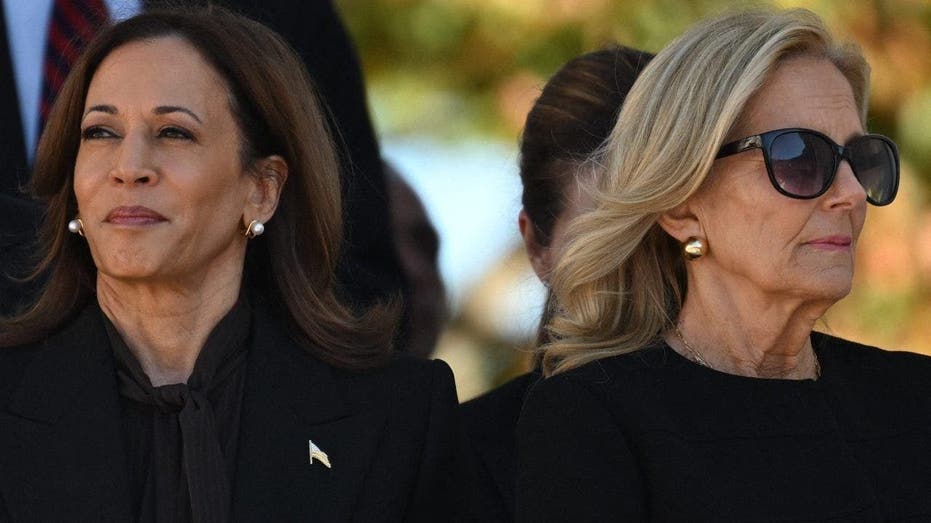Trump Is Doing Biden a Massive Favor on the Border
Joe Biden wants to shut down the border. On Friday, as the Senate continued negotiations over legislation to provide aid to Ukraine in exchange for strict immigration reforms, the president released a statement calling the bill “the toughest and fairest set of reforms to secure the border we’ve ever had in our country. It would give me, as President, a new emergency authority to shut down the border when it becomes overwhelmed. And if given that authority, I would use it the day I sign the bill into law.” It was a Trumpian statement in substance, if not in style—a tacit endorsement of much of the former president’s rhetoric on immigration. And the bill itself, were it to pass Congress and be signed by Biden, would be a huge win for Trump and the GOP in this election year: cementing several items on the right’s anti-immigration wishlist while advancing zero long-standing Democratic priorities. Despite this, Trump and his allies in the House of Representatives are doing everything they can to kill the bill, with the former president promising that only he can fix immigration once in office. It is the latest example of Trump privileging his own political profile over his stated policy goals, but it’s also another reminder that he’s terrible at politics—so terrible that he doesn’t even realize when he’s won. And it may end up saving Biden’s job.Per reports, the as-yet-unreleased bill would allow the president to suspend asylum requests when migrant crossings hit certain thresholds—8,500 in one day or 5,000 over a week—and provide billions of dollars for deportations, detention facilities, and new border agents. The bill contains nothing to help “Dreamers” or to provide a pathway to citizenship for undocumented immigrants—both long-standing Democratic priorities. While the Ukraine aid would be temporary, the changes to America’s immigration system would be permanent. In other words, it would be an unqualified victory for Trump and a gift to his presidential campaign: Biden is openly acknowledging that the United States is being “overwhelmed” at the border, and in response he’s adopting some of his rival’s harsh policies. And yet, Trump has railed against the proposed deal. “It’s not going to happen, and I’ll fight it all the way,” he said at a caucus event in Nevada on Saturday. Trump has a key ally in the fight, as House Speaker Mike Johnson on Friday called the deal “dead on arrival.” Trump’s allies in both chambers of Congress have been similarly dismissive. It has become the latest Trumpian litmus test: Anyone who doesn’t bend the knee is deemed an apostate. In rallying Republicans against the deal, Trump is showing his dominance over the party, proving to Republican officeholders and primary voters alike that he’s still the boss. Trump does have policy objections to the bill, in his own way. His political program has never been about simply reducing undocumented immigration but rather dramatically reducing, if not shutting down, all forms of immigration. Because this bill doesn’t do that—it would likely preserve parole programs that make it easier for asylum-seekers to apply from abroad, i.e., not at border crossings—it must be summarily rejected. But Trump’s opposition is primarily political. In his own estimation, chaos at the border is good for him: He can point to the thousands of daily crossings as evidence of Biden’s failed immigration policies (while also, more sinisterly, use them to bolster his fascistic argument that immigrants are “poisoning the blood of the country”). His allies agree. Were the immigration deal to pass, the thinking goes, it would neuter Trump’s core campaign message and give Biden a bipartisan win. A “border deal that actually reduced the flow of illegal immigration, that would be good for [Biden] politically,” South Dakota Senator Kevin Cramer said last week. That’s not a given. Yes, the proposed deal would allow Biden to shut down the border, thereby presumably restricting the follow of migrants. But it would also—and most likely will, when it’s released later this week—be profoundly controversial among Democratic voters. Biden has seen his approval rating among young voters and people of color sink dramatically in recent months, amid his support for Israel’s siege of Gaza; this bill would likely exacerbate that decline.Trump could use this as a wedge, emphasizing how controversial it is with Democratic voters while also arguing that it doesn’t go far enough—that he would push even more draconian measures in office. Instead, Trump is giving Biden an out, making one of the harshest immigration bills in recent memory seem comparably moderate. At the same time, Biden can now argue that it’s Trump and congressional Republicans who aren’t serious about real immigration reform. Democrats have had enormous success—both in 2018 and 2020—arguing that Trump’s immigration policies are inhumane. The proposed immigration deal undercuts that argument by endorsing many of the ideas pushed b

Joe Biden wants to shut down the border. On Friday, as the Senate continued negotiations over legislation to provide aid to Ukraine in exchange for strict immigration reforms, the president released a statement calling the bill “the toughest and fairest set of reforms to secure the border we’ve ever had in our country. It would give me, as President, a new emergency authority to shut down the border when it becomes overwhelmed. And if given that authority, I would use it the day I sign the bill into law.”
It was a Trumpian statement in substance, if not in style—a tacit endorsement of much of the former president’s rhetoric on immigration. And the bill itself, were it to pass Congress and be signed by Biden, would be a huge win for Trump and the GOP in this election year: cementing several items on the right’s anti-immigration wishlist while advancing zero long-standing Democratic priorities. Despite this, Trump and his allies in the House of Representatives are doing everything they can to kill the bill, with the former president promising that only he can fix immigration once in office.
It is the latest example of Trump privileging his own political profile over his stated policy goals, but it’s also another reminder that he’s terrible at politics—so terrible that he doesn’t even realize when he’s won. And it may end up saving Biden’s job.
Per reports, the as-yet-unreleased bill would allow the president to suspend asylum requests when migrant crossings hit certain thresholds—8,500 in one day or 5,000 over a week—and provide billions of dollars for deportations, detention facilities, and new border agents. The bill contains nothing to help “Dreamers” or to provide a pathway to citizenship for undocumented immigrants—both long-standing Democratic priorities. While the Ukraine aid would be temporary, the changes to America’s immigration system would be permanent.
In other words, it would be an unqualified victory for Trump and a gift to his presidential campaign: Biden is openly acknowledging that the United States is being “overwhelmed” at the border, and in response he’s adopting some of his rival’s harsh policies. And yet, Trump has railed against the proposed deal. “It’s not going to happen, and I’ll fight it all the way,” he said at a caucus event in Nevada on Saturday. Trump has a key ally in the fight, as House Speaker Mike Johnson on Friday called the deal “dead on arrival.” Trump’s allies in both chambers of Congress have been similarly dismissive.
It has become the latest Trumpian litmus test: Anyone who doesn’t bend the knee is deemed an apostate. In rallying Republicans against the deal, Trump is showing his dominance over the party, proving to Republican officeholders and primary voters alike that he’s still the boss.
Trump does have policy objections to the bill, in his own way. His political program has never been about simply reducing undocumented immigration but rather dramatically reducing, if not shutting down, all forms of immigration. Because this bill doesn’t do that—it would likely preserve parole programs that make it easier for asylum-seekers to apply from abroad, i.e., not at border crossings—it must be summarily rejected. But Trump’s opposition is primarily political. In his own estimation, chaos at the border is good for him: He can point to the thousands of daily crossings as evidence of Biden’s failed immigration policies (while also, more sinisterly, use them to bolster his fascistic argument that immigrants are “poisoning the blood of the country”).
His allies agree. Were the immigration deal to pass, the thinking goes, it would neuter Trump’s core campaign message and give Biden a bipartisan win. A “border deal that actually reduced the flow of illegal immigration, that would be good for [Biden] politically,” South Dakota Senator Kevin Cramer said last week.
That’s not a given. Yes, the proposed deal would allow Biden to shut down the border, thereby presumably restricting the follow of migrants. But it would also—and most likely will, when it’s released later this week—be profoundly controversial among Democratic voters. Biden has seen his approval rating among young voters and people of color sink dramatically in recent months, amid his support for Israel’s siege of Gaza; this bill would likely exacerbate that decline.
Trump could use this as a wedge, emphasizing how controversial it is with Democratic voters while also arguing that it doesn’t go far enough—that he would push even more draconian measures in office. Instead, Trump is giving Biden an out, making one of the harshest immigration bills in recent memory seem comparably moderate. At the same time, Biden can now argue that it’s Trump and congressional Republicans who aren’t serious about real immigration reform.
Democrats have had enormous success—both in 2018 and 2020—arguing that Trump’s immigration policies are inhumane. The proposed immigration deal undercuts that argument by endorsing many of the ideas pushed by the former president and many of his most extreme advisers, notably Stephen Miller. So it’s a good thing that the bill almost certainly won’t pass the House. But it’s all thanks to a bumbling politician who consistently prioritizes flawed, short-term political calculations over his professed long-term policy goals. It may just be a fatal weakness that keeps him out of the White House.



